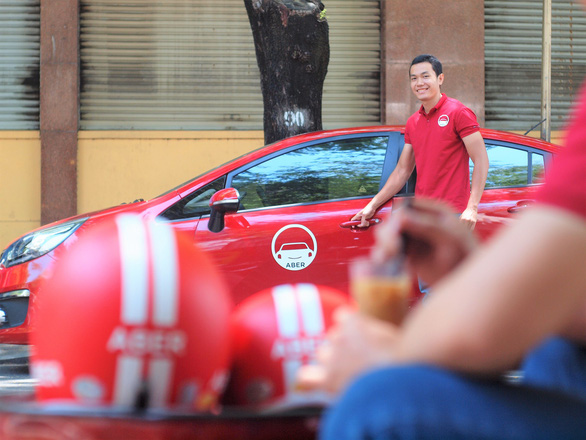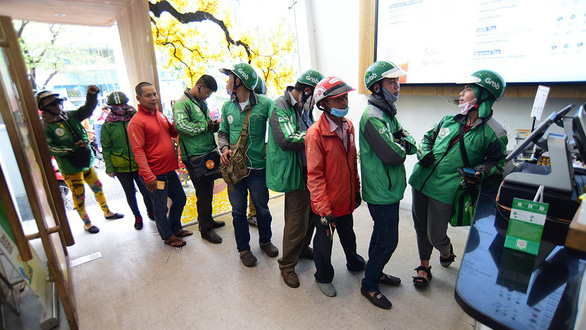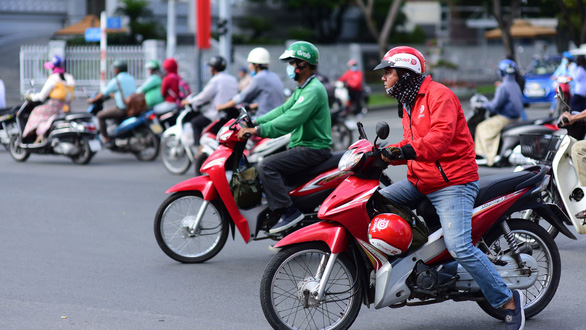A number of apps, both homegrown and international, that were launched last year in an attempt to break the domination of Grab in Vietnam have silently ‘disappeared’ from the market due to apparent tough competition.
Uber's exit from Southeast Asia, including Vietnam, in April 2018 enabled the regional rival Grab to easily dominate the Vietnamese market, while at the same time encouraged local transport companies to launch their own ride-hailing apps to fill in the blank left by the U.S. tech company.
Among those Vietnamese companies that hopped on the ride-hailing bandwagon were Mai Linh, Fast-Go, Vato, Aber, MLV, Go-ixe, and Xelo.
If many of these names sound unfamiliar to you, it’s because they are.
Even though they were launched with the main goal of competing with the market leader Grab, most of these newcomers struggled to attract both passengers and drivers, despite their appealing promotions and preferential policies.
Many of these Vietnamese apps have therefore left the market even before customers had a chance to know about them.
In June 2018, for instance, Aber, which was developed by a group of Vietnamese engineers in Europe, entered Vietnam’s ride-hailing market, offering as many as six different services including motorbike, car, delivery, and business car.
Aber said it stood out from competitors as the app applied no fare hike during peak hours, and only charged drivers a monthly rate based on their total income that month, instead of taking a cut from every ride they made.
But the company’s attempt to differentiate itself from other ride-hailing apps turned out to make no difference.
Aber has recently announced its temporary absence from the market “for a bigger return”, yet without saying when.
According to a company’s leader, Aber “has to find another direction” amid tough competition from such rivals with a lot of money to spend as Singapore-based super app Grab and Go-Viet, the Vietnamese brand of Indonesian transportation network Go-Jek
 |
| An Aber driver is seen in this photo. Photo: Linh Ha |
A leader of local app VATO, which claimed to have received US$100 million from Vietnamese bus line Phuong Trang and was expected to be a ‘counterweight’ to Grab and Go-Viet, also admitted the same thing.
“As the competition from Grab and Go-Viet has been quite harsh, our company has to find a different direction,” said the VATO leader.
According to drivers and frequent customers of ride-hailing apps like Fast-Go, MLV, and Go-ixe, the coverage of these applications in the market is quite low, with only a small number of drivers, leading to long waiting time for both drivers and users.
Industry insiders say that the exit of these apps from the ride-hailing industry is already in sight.
Even fiercer competition awaits
Despite the demises of several Vietnamese ride-hailing apps, Tran Thanh Hai, general director of Vietnamese technology startup Be Group Corporation, believes there is still great potential for newcomers to join Vietnam’s technology-based transportation market.
The company launched its ride-hailing platform Be last December.
According to evaluation reports of some international organizations, Vietnam’s ride-hailing market revenue can reach US$500 million a year.
Hanoi and Ho Chi Minh City collectively account for 93 percent of the market, meaning there is plenty of room to grow for ride-hailing apps in other localities across the country.
Besides personal transportation, technology-based transportation companies are also expanding to other sectors, including food delivery, where competition is already fierce with two main players, Grab and Go-Viet.
 |
| Grab and Go-Viet’s food delivery drivers queue to buy drinks at a store in Ho Chi Minh City. Photo: Quang Dinh / Tuoi Tre |
“It is very wasteful to not take advantage of tens of thousands of drivers for other services such as goods delivery, food delivery, and personal shopper,” Hai of Be Group said, adding that his company has plans to join the food deliver sector.
Meanwhile, Grab said it has received an additional $1.46 billion from SoftBank's Vision fund for business expansion from its current services of financing, food delivery, freight forwarding, digital content and digital payments.
Bui Danh Lien, former chairman of the Hanoi Transport Association, said competition in Vietnam’s technology-based transportation market is like a race to burn money.
“Only businesses with sufficient resources and a wise strategy can stay in and win the biggest market share,” Lien said.
Like us on Facebook or follow us on Twitter to get the latest news about Vietnam!




















































